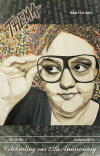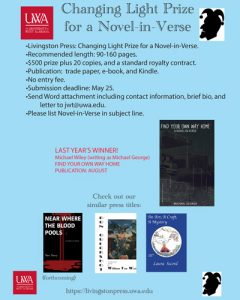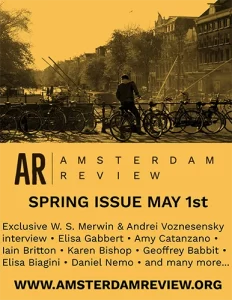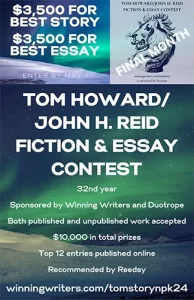THEMA – Autumn 2013
Thema’s distinguishing feature—the prompt that drives every issue—is still and always its delightful strength. Like a well-designed skeleton, each issue’s prompt provides a scaffolding from which to build a full body of coordinated limbs, each of which is, in its imperfect excellence, a strapping member of an unexpectedly vigorous whole. You want to examine every one, especially carefully in this issue, since its theme is perception, seeing well: “Eyeglasses are needed.”
Thema’s distinguishing feature—the prompt that drives every issue—is still and always its delightful strength. Like a well-designed skeleton, each issue’s prompt provides a scaffolding from which to build a full body of coordinated limbs, each of which is, in its imperfect excellence, a strapping member of an unexpectedly vigorous whole. You want to examine every one, especially carefully in this issue, since its theme is perception, seeing well: “Eyeglasses are needed.”
The droll cover image by Cheryl Hicks, from a distance simply a woman of a certain age and type adjusting her large glasses, is, on closer view, an illustration of art’s demand to take exactly that closer view, to employ a certain kind of perspective. Close up, what looks like fine shading on the skin of the woman’s hand and face is actually a collage of film quotations. It’s part of a series Hicks calls “I Just Don’t Read Like I Used To.” Perhaps none of us ever read like we should, closely, carefully. Metaphorical eyeglasses are always in order. And real ones? Maybe, sometimes, they’re not needed as much as we think they are.
The stories and poems prove both halves of the equation. The half-blind war veteran in Kemp Pheley’s “Dunken” suffers flashbacks and OCD pacing in his equally OCD shoes, but he and his VA brethren keep each other alive with their shared memories and sympathy until finally a couple of “Special someones” show up who recognize the brave humanity behind their ugly wounds.
The mourning mother in Susan Fenner’s “Seeing the Imprint,” a photographer who, in her grieving, has ceased photographing, is shocked by the impact of a bird against her window in the opening scene of the story. But when her dead son’s girlfriend comes by unexpectedly to talk about the boy’s compassion—his tendency to “leave an imprint” wherever he went—she is able to see the titular imprint of the bird in the glass, perceive its perfection, and pull out her camera once again. In both stories, discernment of a particular kind is required. When it’s accessed, redemption reigns.
Humor reigns as well, in this issue. “Oval, Owl,” a poem by Matthew J. Spireng, and “Lost at the Party” by Nathan Alling Long, are jokes about bad eyesight. You have to read them to get them; I mustn’t give them away. But poignancy also has a place. Valerie Loveland’s “Optician Apprentice” gives tender voice to the parts and purposes of the optometrist’s office (remember the drawers full of frames, the walls covered with temples?), while the speaker in “A Reading” by Abigail Wyatt recalls the world before glasses, the world where “there were whirling colours / shifting shapes, false imaginings,” and the only safety was in “the pages / cradled inches / from my nose.”
Age has a significant place in the annals of eyeglasses, of course. “Blip” by Debbie Lampi, “Cataracts” by Robert Cooperman, “A Vision” by William Guy Gallagher, “First” by John Grey, and “Old-Timer’s Dis-Ease” by Robert Funge all lament the eye-related problems that come with age—macular degeneration, the need for bifocals, resistance to change made necessary by failing eyesight. Beautiful lines shine out of these pieces; take, for example, this excerpt from “Optician Apprentice”:
I’ll tell you a secret: prisms hide in every lens.
When I open and turn on the lights, the optical
shop shines with glass and mirrors. When I close,
the spectacles sleep in little lined beds.
Each case squeaks shut as I tuck them in.
And listen to these from Kristin Camitta Zimet’s “Revision,” another poem about age:
Easy as put-and-take, to fish
my old lens, warty trout,
deep dodger, shadow-lodger,
out of the gloom it lurks in
under rocks gone mossy-slick
with up-creek ooze
And the Gerard Manley Hopkins-like alliteration and assonance continue in this delicious vein till the visually rich, age-defying conclusion.
“Rescued,” by Susan Duke, deserves particular notice. In this story, eyeglasses are needed for multiple practical and symbolic purposes. Without them, a pair of stranded sisters cannot start a signal fire to direct searchers’ attention to themselves. One of the sisters has hidden behind them for tragic reasons for too many years. Giving them up may change her life forever. Fortunately the two purposes dovetail.
Clearly, the power of the prompt to create unexpected resolutions (yes, in the case of eyeglasses a pun!) achieves its purpose again. Thema has a winning premise. Read this issue—you won’t need eyeglasses to see for yourself.
[themaliterarysociety.com]





